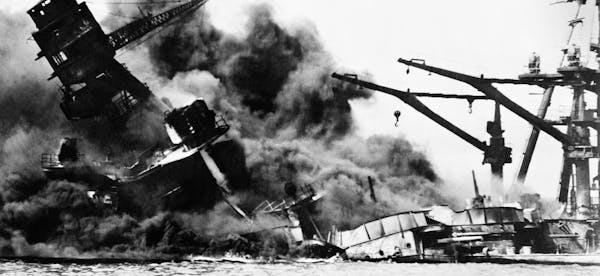As we remember and mourn those servicemen and -women who died when Imperial Japan launched a surprise attack on the American military installations at Pearl Harbor 75 years ago, we should also remember that was not just one of the bloodiest strikes on American soil. Pearl Harbor also marked "an end to illusions," as the theologian Reinhold Niebuhr described the United States' sudden mindfulness of the threats posed by Japan and Nazi Germany.
Until that day of infamy, many Americans had held optimistically to certain beliefs about war and international politics that proved illusory. Such as, that dictatorship and aggression in faraway lands did not concern the U.S.; that alliances were a source of vulnerability rather than strength; and that a strong military made war more, rather than less, likely.
The classic 1970 movie about Pearl Harbor, "Tora! Tora! Tora!, " quotes the operation's mastermind, Japanese Adm. Isoroku Yamamoto, warning ominously that Japan had "awakened a sleeping giant." Whether Yamamoto actually penned those words remains disputed, but the phrase reflected his sentiments. In the words of historian David Kennedy, America's "industrial base and large population would make it a formidable foe if it ever mustered the political will to fight, and probably an invincible foe if the conflict were protracted."
And so it came to pass.
After the attack, we built a globally dominant arsenal and mobilized a military that, with our allies, conquered Japan and Germany less than four years later.
Once awakened, the giant did not return to its slumber. Rather, the U.S. emerged at the end of the war as the world's dominant superpower, with unprecedented military might and an atomic monopoly. We also assumed the mantle of global leadership and spurred the creation of the international system that still shapes the world today.
In the process, America underwent a series of diplomatic and economic revolutions: from isolationism to international leadership; from protectionism to promoting an open trading system and the institutions to manage it; and from disdaining alliances to forming an extensive network of allies, even with former enemies such as Japan and Germany.
The Pearl Harbor shock also prompted the creation of the modern American national security system. Immediately after the war, the Truman administration, mindful of the intelligence and policy failures that left us vulnerable to surprise attacks, partnered with Congress to establish many of the institutions that still run our foreign and defense policy today, such as the National Security Council, the Department of Defense and the CIA.
In short, as catastrophic as it was at the time, Pearl Harbor also led directly to what some called "the American Century," our nation's long run of global leadership that not only redefined our place in the world, it redefined the shape of the world itself.
It is something that bears repeating as we prepare to remember the events of Dec. 7, 1941.
Many Americans look at the world now with the same sense of disquiet that we did 75 years ago. In the Far East, we see China's rising power and North Korea's nuclear weapons destabilizing the region. In Eurasia, we see Russian aggression reminiscent of the Soviet Union. In the Middle East, we see a region torn asunder by war. On virtually every continent, we see the threat of jihadi terrorism.
Meanwhile, as a nation, we feel exhausted and weary, uncertain whether we can or should continue showing international diplomatic and economic leadership. Our political leaders in both parties seem to share this sentiment.
President Obama has voiced frustration toward our allies and skepticism about our own ability to influence the international stage. During the campaign, Donald Trump differed in tone but not in substance from Obama, as he also spoke disparagingly of America's alliances and our global role. How he will govern remains to be seen, though fortunately, some of his Cabinet appointments and conversations with foreign leaders indicate a renewed commitment to international leadership.
Such is one lesson of Pearl Harbor and its aftermath. Retreating behind our borders does not render us safe from threats abroad. The world is a better place, and our nation is more prosperous and secure, when the U.S. leads from the front.
That is as true today as it was in 1941.
William Inboden is executive director of the Clements Center for National Security and an associate professor at the LBJ School of Public Affairs at the University of Texas at Austin. He previously served at the State Department and on the National Security Council staff in the George W. Bush administration. He wrote this article for the Dallas Morning News.

From the Editorial Board: A divided Minnesota shouldn't stall state lawmakers

Sheletta: We're seeking strength in joy, not storming the Capitol
Dabney: Ballot outcomes create a new dynamic for Minnesota's cannabis market and regulatory landscape

